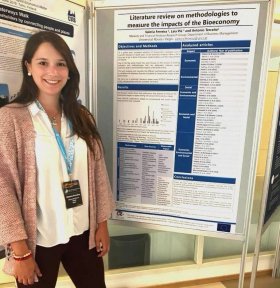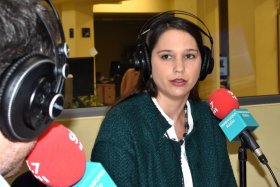Valeria Ferreira Gregorio


PhD Programme: Economics and Business
Research group: MARFINAN - Mercats i Anàlisi Financera
Supervisors: Antonio Terceño Gómez & Laia Pié Dols
Bio
Valeria Ferreira studied Accounting at the University of the Republic in Uruguay. She did her Master in Business Administration and Management at the Universitat Rovira i Virgili. She has been dedicated to research for more than one year. She is specialized in bioeconomy, circular economy, ecological economics and environmental issues. She is part of the research group Market & Financial Analysis of the URV, and she is teaching the subject Mathematics of financial operations.
Project: Multisectoral models applied to the analysis of the Bioeconomy in Spain
The focus of this thesis is the bioeconomy in Spain. The aim is to analyse the contribution of each of the bioeconomy products, enabling us to identify those that are strategic in terms of generating wealth and employment. For this purpose, the symmetric bioeconomy social accounting matrix with basic prices for Spain for the year 2010 was constructed, from which we were able to obtain a descriptive analysis of the Spanish bioeconomy and to apply it to multisectoral linear models and various analysis techniques classified within the traditional and hypothetical extraction methods. The results are useful to study the structure and linkages between sectors, providing information on the capacity of each bioeconomy account to generate income or increase employment in the rest of the economy, and explaining how the rest of the economy would be affected by their hypothetical extraction. This study enabled us to specify the most suitable accounts that will drive the development of the bioeconomy and economic growth. The results demonstrate that the Spanish bioeconomy is still focused on traditional sectors (such as agriculture, biomass, and food) and has not yet developed its potential in more innovative bio-based products. Consequently, these sectors should also be promoted to shift towards a bio-based economy in Spain. The final conclusions of this thesis thereby provide the opportunity to understand the behaviour of the bioeconomy in Spain and to evaluate possible measures that can be taken to promote its development. One of the main conclusions is that many products of the Spanish bioeconomy can be considered keys or drivers able to stimulate the economy and employment through exogenous investment measures. This type of information is important, especially for policy makers in decision-making processes relating to plans and investments whose objective is the promotion of the Spanish Bioeconomy.
Open Access publications
- Ferreira, V., Pié, L., & Terceño, A. (2020). The Role of the Foreign Sector in the Spanish Bioeconomy: Two Approaches Based on SAM Linear Models. International Journal of Environmental Research and Public Health, 17(24), 9381. View full-text
- Ferreira Gregorio, V., Pié, L., & Terceño, A. (2018). A systematic literature review of bio, green and circular economy trends in publications in the field of economics and business management. Sustainability, 10(11), 4232. View full-text
- PHD THESIS: Multisectoral models applied to the analysis of the Bioeconomy in Spain
International secondments
- Ecological Economics Institute of the Vienna University of Economics and Business. Vienna, Austria. 3 months (2019).
- Joint Research Centre-European Commission. Seville, Spain. 10 days (2018).
Outreach activities
- European Researchers’ Night 2019: “La Economía Circular y el consumo responsable”.
News
- Diari Digital de la URV. News: Some Spanish bio-based products are highly dependent on the foreign sector to satisfy its total supply
- Diari Digital de la URV. News: Researchers of URV analyse the concepts of Bioeconomy, Circular Economy and Green Economy
- Horizon Results Platform: The analysis of the Bioeconomy impact is necessary in order to promote its development in Spain



